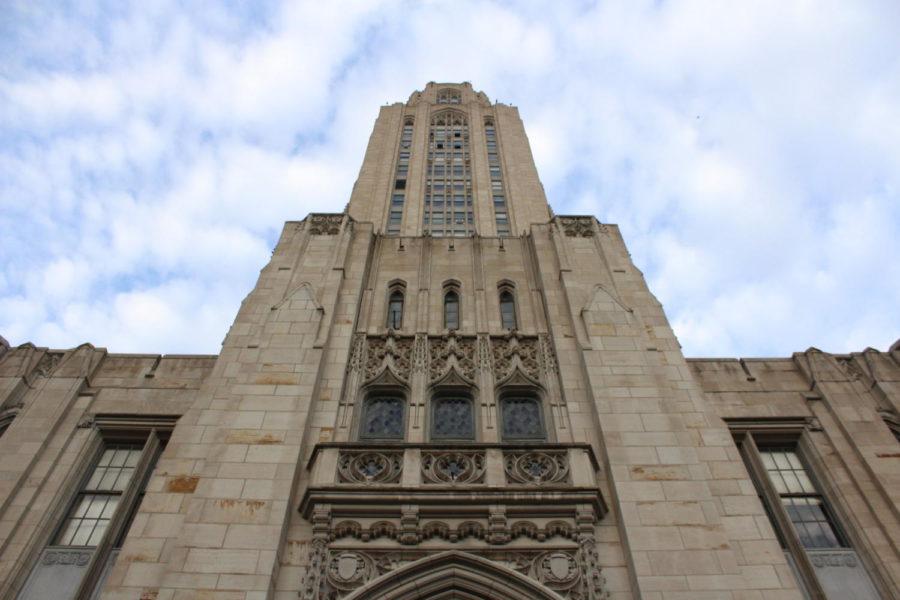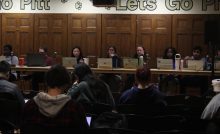‘It was our people that made us special’: Paper, CMRO reflect on Pitt’s pandemic procedures


A view of the Cathedral of Learning.
The Journal of American College Health published a paper in January that analyzed Pitt’s approach to mitigating COVID-19 on campus. According to the paper, Pitt’s pandemic procedures could serve as an example for future events.
John Williams, chief of the medical school’s Division of Infectious Diseases, said rather than make students test twice a week, Pitt implemented random sub-sampling testing. He said testing students each week did not prevent infections but found them. He said ultimately “spending $20 million on tests would result in professors being fired.”
“We crafted a plan to do random sub-sampling testing,” Williams said. “Completely random but it was very strategic. We didn’t just randomly shoot email invites for testing off to people. We divided the students into on-campus, off-campus, professional schools, etc. We were random within each of those so that we were testing about 10% every week.”
Joe Suyama, the director of the COVID-19 Medical Response Office, said he thinks the reason Pitt “did so well” during the COVID-19 pandemic was “because we had a long-standing emergency preparedness group in the health and safety perspective that had been with local health authorities, local law enforcement, local government leadership for many, many years.”
Suyama said the CMRO served as the expert voice when determining how to deal with COVID-19 mitigation on campus.
“We knew a hierarchy was necessary and part of this particular response was to get together a group called the CMRO to ensure virus mitigation, which was not necessarily a big part of what happened in previous iterations of the response.”
During the pandemic, students and faculty experienced a myriad of ups and downs related to the COVID-19 pandemic, from debates over mask optional policies to vaccine mandates to frequent shifts between in-person and online classes.
Melissa McGivney, a professor and associate dean for partnerships at the School of Pharmacy, has led the Pitt CoVax initiative since January 2021. She said the University offered to distribute the first round of vaccines once the Allegheny County Health Department received vaccines.
Pitt distributed its very first COVID-19 vaccines in 2021, with group 1A of health care personnel receiving the vaccine.
“We stood up and engaged our people to provide care,” McGivney said. “The most beautiful thing I think is there were people that were not health professionals that also stood up and said, ‘We’re going to help.’ They were the individuals who pushed the wheelchair around, who were checking people in, who were making sure that people knew where to go on our campus and felt welcome. So it was our people that made us special.”
Williams said Pitt’s procedures were successful because students were engaged and followed guidelines. He said universities took one of two extreme approaches — test constantly or not at all, assuming students would unmask and attend parties either way.
“We thought the students are young adults who are smart enough to understand what’s at stake,” Williams said. “If we get them really engaged, that will be a key thing and that’s something that I think we did better than many other schools.”
McGivney said through continuous engagement across schools of health sciences, Pitt is continuing to distribute vaccinations to the community.
“The other thing is we’ve not stopped,” McGivney said. “That is unique nationwide. We’ve felt this commitment to be able to continue to provide a pipeline of vaccines to not only our campus but our neighbors and to make sure that we had every COVID vaccine available.”
Williams said students were engaged in policy decision-making through committees. He said he took their recommendations very seriously, especially when committees said students would not follow instructions to quarantine in their dorm for 14 days.
“We had students on our committees such as policy and operating committees,” Williams said. “They were charged to go out and then recruit other students for their committees from all walks of campus life, like Greek, professional schools, artsy students, math nerds. They tried to get a broad representation to kind of have those students’ input and sort of a finger in the wind of ‘will this fly with students?’”
Suyama said students were generally very compliant because they were told that the restrictions were set in place to keep the campus safe and open.
“I would say that people were generally not only interested in being a good steward to our guidelines, but also, I wanted to make sure that they got some kind of college experience,” Suyama said. “In order to do so, we had to set the ground rules, and for the most part, people did a very good job of those mostly because I think we provided a good rationale for people to do it.”
Recent Posts
SGB addresses concerns about ICE presence on campus, hears SJP lawsuit against administration, approves governing code bill
At its weekly meeting on Tuesday at Nordy’s Place, Student Government Board heard concerns about…
ACLU of Pennsylvania sues Pitt over SJP suspension
The ACLU of Pennsylvania filed a federal civil lawsuit against the University of Pittsburgh and…
Marquan Pope: The ultimate shark
One of the most remarkable things about sharks is that an injury doesn’t deter them.…
Who Asked? // Do we really get a summer vacation?
This installment of Who Asked? by staff writer Brynn Murawski mourns the seemingly impossible perfect…
Notes From an Average Girl // Notes from my junior year
In this edition of Notes From an Average Girl, senior staff writer Madeline Milchman reflects…
Meaning at the Movies // The Power of the Movie Theater
In this edition of “Meaning at the Movies,” staff writer Lauren Deaton discusses her love…

